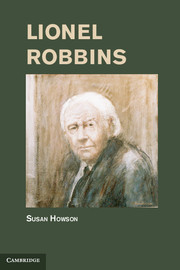Book contents
- Frontmatter
- Contents
- Illustrations
- Abbreviations
- Introduction
- One Father and Son
- Two The Great War
- Three Postwar
- Four The London School of Economics
- Five Iris Gardiner
- Six New College Oxford
- Seven The Young Professor
- Eight Fritz and Lionel
- Nine The School in the Mid-1930s
- Ten The Approach of War
- Eleven The Economics of War
- Twelve Director of the Economic Section
- Thirteen Anglo-American Conversations
- Fourteen The Law Mission and the Steering Committee
- Fifteen 1 9 4 4
- Sixteen The Last Months of the War
- Seventeen The Postwar Settlement
- Eighteen Return to the School
- Nineteen The End of the Transition
- Twenty LSE in the Early 1950s
- Twenty-One Chairman of the National Gallery
- Twenty-two Lord Robbins
- Twenty-three The Robbins Report
- Twenty-four The Sixties
- Twenty-five The Arts
- Twenty-six The Troubles at LSE
- Twenty-seven Retirement
- Conclusion
- Bibliography
- Index
Eleven - The Economics of War
Published online by Cambridge University Press: 07 October 2011
- Frontmatter
- Contents
- Illustrations
- Abbreviations
- Introduction
- One Father and Son
- Two The Great War
- Three Postwar
- Four The London School of Economics
- Five Iris Gardiner
- Six New College Oxford
- Seven The Young Professor
- Eight Fritz and Lionel
- Nine The School in the Mid-1930s
- Ten The Approach of War
- Eleven The Economics of War
- Twelve Director of the Economic Section
- Thirteen Anglo-American Conversations
- Fourteen The Law Mission and the Steering Committee
- Fifteen 1 9 4 4
- Sixteen The Last Months of the War
- Seventeen The Postwar Settlement
- Eighteen Return to the School
- Nineteen The End of the Transition
- Twenty LSE in the Early 1950s
- Twenty-One Chairman of the National Gallery
- Twenty-two Lord Robbins
- Twenty-three The Robbins Report
- Twenty-four The Sixties
- Twenty-five The Arts
- Twenty-six The Troubles at LSE
- Twenty-seven Retirement
- Conclusion
- Bibliography
- Index
Summary
The LSE Michaelmas term 1939 began late and in Cambridge. The School was lucky to be there. It had protested against a University plan to evacuate it to Glasgow and Aberdeen; it preferred Reading, but Reading could not provide sufficient accommodation. Carr-Saunders began to negotiate with Oxford, but in mid-July the question of a wartime location was still not settled (Standing Committee 23 March, 25 May, 15 June and 13 July 1939). On a visit to Cambridge he ran into Austin Robinson, who introduced him to the University Treasurer over lunch at Sidney Sussex (Robinson’s college), and ‘the three of them settled on a college that had not yet been commandeered by a [government] ministry preparing for evacuation’ (Cairncross 1993, 78). On 25 July the Governing Body of Peterhouse agreed to take in LSE if war broke out; Carr-Saunders immediately accepted. Administration and part of the library were housed in New Court, a building (now known as The Hostel) opposite the main gate of Peterhouse. The School rented Grove Lodge, also in Trumpington Street, next to the Fitzwilliam Museum (and now the Fitzwilliam director’s house), for student common rooms and a lending library. Some classes were held there but most lectures were given in the Cambridge lecture rooms. In 1939/40 evening classes and public lectures were still given in London, at Canterbury Hall in Cartwright Gardens, the School buildings being occupied by the Ministry of Economic Warfare (Dahrendorf 1995, 341–4).
There were 620 LSE students in Cambridge in 1939/40 and another 350 evening students in London, compared with a prewar total of around 3000. The academic staff was immediately depleted as several members went into government service, including Allen and Robertson to the Treasury, Benham to the Ministry of Economic Warfare – but he resigned a few weeks later and returned to LSE because of ill health – and Webster to the Foreign Research and Press Service. The governors rescinded leaves already granted, including a sabbatical leave for Durbin and leave of absence for Hayek to lecture in America (Standing Committee 28 September and 24 November 1939). The LSE teaching staff in economics in 1939/40 thus comprised Benham, Coase, Durbin, Edwards, Hayek, Kaldor, Paish, Plant, Robbins, Schwartz and Thomas. A year later most of these were also in government service.
- Type
- Chapter
- Information
- Lionel Robbins , pp. 342 - 386Publisher: Cambridge University PressPrint publication year: 2011

